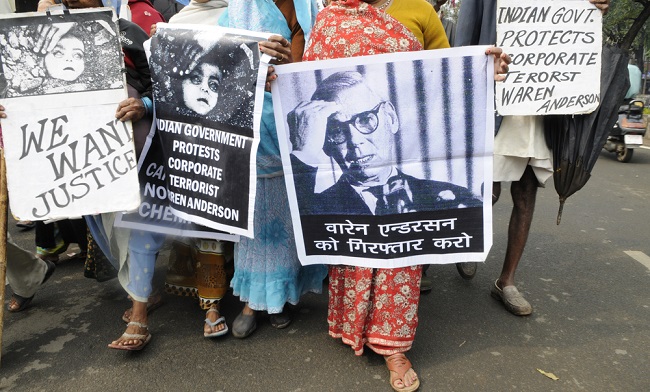
Vulnerabilities remain 30 years after Bhopal Gas Tragedy
Satyapal Menon | The Dollar Business
 Much of the attention goes to Warren M. Anderson of Union Carbide when it comes to the Bhopal disaster, but we overlook problems that persist everywhere in India
Much of the attention goes to Warren M. Anderson of Union Carbide when it comes to the Bhopal disaster, but we overlook problems that persist everywhere in IndiaThree decades have not erased memories of the one of the biggest man-made disasters and a crime against humanity that happened, claiming thousands of lives and creating an aftermath that continue to debilitate lives. It is not just the nightmares of the Bhopal Gas tragedy that haunt us, but also the total disregard by the policy makers to a disaster that always was waiting to happen. It happened and the government was caught napping. But was it an awakening for those who govern a country’s fate? Absolutely not! In fact what followed was equally sordid as the tragedy. The notorious legal machinery ensured that the tragedy persists by resorting to the rigmarole of irrational procedures, while the ramifications took deep roots and grew to cancerous proportions. We hear several noises from the corridors of power about making India clean and green, but the question that needs to be asked is: Are such measures enough to prevent disasters such as the one that took place in Bhopal? Recently, at a forum on “Doing Chemistry with a Purpose: Innovative, green and safe solutions”, the Confederation of Indian Industry (CII) discussed everything but solutions to create a green environment. Figures were reeled out. Indian Chemical industry, which accounts for around 2.51% of India’s overall GDP and almost 16% of the manufacturing sector in India is expected to grow at 15% per annum in the coming years. Dr. A.J.V. Prasad, Joint Secretary, Department of Chemicals and Petrochemicals said, “The Chemicals industry already makes a major contribution to what’s made in India. The Chemical industry is expected to grow at a rate of 15% per annum over the next few years. The current government is working on the national chemical policy and will be coming up with the document soon.” According to Prasad, the Indian Chemical industry, including fertilisers and petrochemicals, is estimated at around $144 billion which is about 4% of the global market of $3.6 trillion. However its impact is much broader, he said. The CII claimed that the forum provided an opportunity to consider what ‘Make in India’ really meant and its implications for the Indian industry with special focus on the chemical sector. We have come a long way from what happened in Bhopal in 1984. Today, India is a major exporter of Chemicals and Pharmaceuticals and India’s Pharma exports are to the tune of $11 billion with generics and bulk drugs comprising a major share. However, there are vulnerabilities. According to environmental experts, many countries in the developed world are using India as a dumping yard and outsourcing the manufacture of hazardous products to India to keep their own premises clean. Unsurprisingly, there were immediate concerns last year in India over the ban of neonicotinoid chemicals in EU and many feared that the chemicals will find their way into India which is a large and unregulated market for chemicals. According to Dr. Bas Bouman, Senior Scientist at the Philippines-based International Rice Research Institute (IRRI), there is an urgent need to regulate and control the markets in several Asian countries, including India. In one of his articles, Dr. Bouman, writes, “In Asia, insecticides are often marketed by small shopkeepers who sell them as ‘fast-moving consumer goods’ alongside products such as shampoo and soap.” The reason: there are no regulations or rules in place in India to prevent violations, and the few there are not implemented. Do we really care about a Swachh Bharat?
This article was published on November 29, 2014.






 to success.
to success.